Top 5 Alternatives to Spotify
You can't have the biggest, most accessible music library on the planet without making a few enemies. In Spotify's case, their enemies are any artist outside of the top 1%, as well as listeners who care about their favourite artists lack of revenue. Fans are now considering alternatives to the music giant.
By Charlie Walker | Updated Sep 4 2023
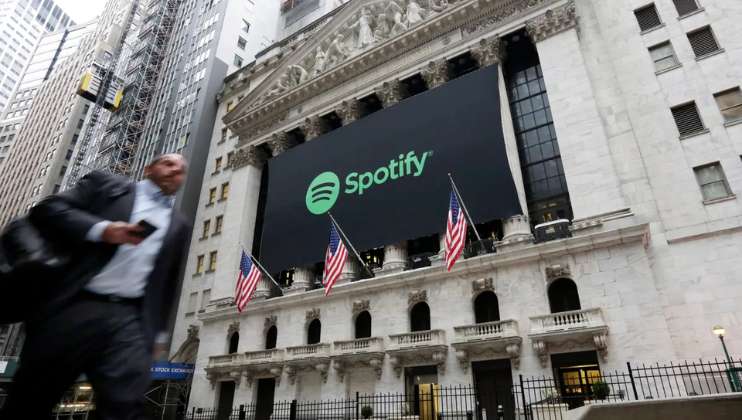
Despite almost completely dominating the music industry and becoming the primary way to listen to music this decade, there has been quite some pushback from listeners and artists alike. It’s a well known fact that Spotify pay a pittance to their artists (£0.002 per stream, or 3000 streams per pint), and even massive artists will tell you that streaming revenue comprises a fraction of their overall profit.
More so, the ubiquity of Spotify, an online, non-physical service, has lead to concerns of its longevity; if the shareholders pull out and Spotify ceases to be, so do all of our music libraries. The attachment we have to albums, songs, even artists, is weakened by the experience of streaming. Many young listeners barely know the artists behind their favourite songs.
In the face of being the most convenient, accessible, and most importantly the cheapest way to experience music, Spotify is making us all a bit worried about music’s present and future. So, here are some good and sustainable alternatives to Spotify without having to resort to piracy:
Bandcamp
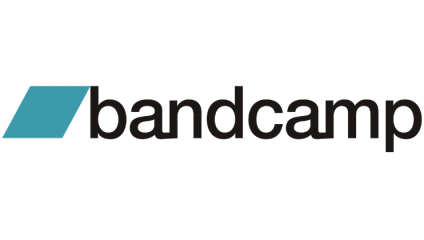
By far the greatest alternative, Bandcamp is a comprehensive streaming service, music library, and online store for physical music as well as merchandise. You support the artist directly by purchasing their music, and the option for downloading the files allows you to build an offline library. In most cases, you don’t need to purchase tracks in order to stream them. Your online library will build up over time, which can all be streamed on the Bandcamp app. You can even upload your stuff for free and take in pure profit.
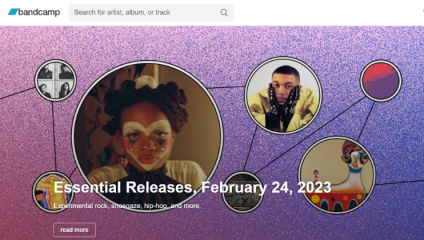
Most importantly, the money you spend on the music goes directly to the artist; on average, 82% of the money you spend goes straight into the artists pocket. That’s a bigger share than most independent artists get from their labels (around 50%) and way more than big labels (around 10%). To support the artist even further, you can donate, buy whatever merch they have available, and often buy limited edition physical copies of their records that aren’t available anywhere else (in cassette form too!). In fact, most bands use Bandcamp as a matter of practice when selling merch.
There are a few drawbacks, of course. Bandcamp doesn’t have everyone on there, and usually caters toward smaller, independent artists. You won’t find Taylor Swift, for example, but few would shed a tear over such a loss. If your main concern is the ephemerality of streaming, or the lack of financial support your favourite artists are receiving, Bandcamp might just be the one.
Soundcloud
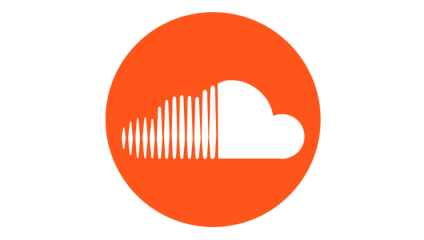
The other great candidate, Soundcloud has a massive library of commercial and independent music with options for downloading and now remixing. In recent years it has become the darling streaming service of underground electronic fans, especially DnB, where often tracks will only be available on Soundcloud as previews before general release, finding their way into DJ sets, becoming the modern-day equivalent of the white label or dubplate. The service is free but with advertisements every few songs, but the paid version is a bargain at £6 a month.
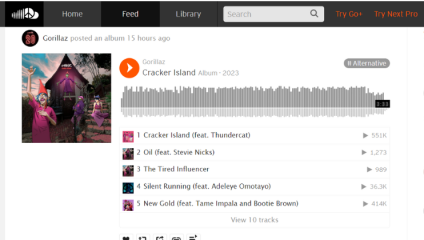
The platform, unlike Bandcamp, will typically have the work of bigger artists, with Gorillaz’ new album on Soundcloud available to stream for free. However, it again is more catered towards listeners with an ear for the underground. The DIY ethic stays alive on Soundcloud, which had begun the careers of many an artist, to the point of starting its own subgenre (Soundcloud rap).
The drawbacks include a lack of an offline digital music library unless you upgrade to the highest tier of Soundcloud Go, costing a tenner a month. Similarly, the sound quality isn’t the best, unless, again, you opt for Soundcloud Go+. If you are a DJ or an electronic music aficionado, Soundcloud Go+ lets you mix and remix tracks within DJ apps. For the casual listener, however, more can be done to improve.
Ampled
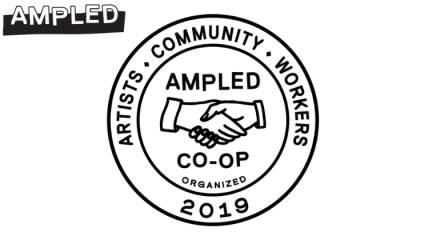
Essentially a Patreon-like service for artists, Ampled is owned by its artists and its workers. There are no venture capitalists or industry carpet-baggers here, just artists and music lovers with a passion for equality. Their ethos is pure; music for the people, of the people, by the people. They are fully transparent with their revenue, voting history, data policy, and soon their investment and diversity reports will be published. Artists can also choose what share of their revenue goes toward the operating cost of Ampled. For listeners who are concerned about the tinpot revenue of their artists, Ampled is a dream come true.
The drawbacks here though are significant. There aren’t many artists who use the service, and almost no signed or mainstream artist uses it to allow their music to be streamed. This makes the service fantastic for finding unknown, underground music, but hardly a pure alternative to a massive platform like Spotify. The more it grows, however, the more artists will use the service, and the dependency on Spotify will weaken.
Resonate
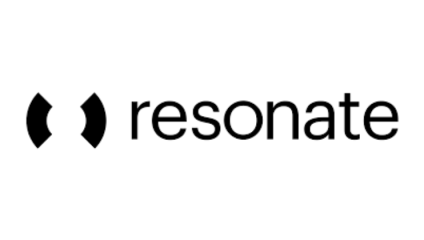
A similar ethos to Ampled, Resonate is a pay-as-you-play streaming service without monthly fees, with what they call “artist centred and user-centric stream2own payments”. You can buy credits that enable for a set amount of hours for listening, but new users get a free 4 hours of listening before having to purchase anything. The library is pretty decent and growing in size, with an emphasis on electronic music and small, independent artists.
At the core of Resonate’s vision is democracy, where members meet as a community every Thursday to discuss changes and decision-making, and you too can be a part of this discussion! Their means of operation are simply put: “Listeners earn membership with a $10 contribution. Artists earn membership after their first upload. Workers earn membership by helping us build.”
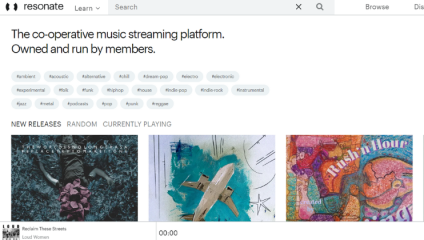
The drawbacks with Resonate are similar to Ampled: a relatively small library of largely unknown musicians, and its unviability of replacing Spotify wholesale. Artists with a following should be encouraged to use it, as it would bring attention to the platform as well as allow artists to take in their fair share of profits. But until then, Resonate will simply be one of the many services you could use to replace the Spotify habit.
In essence, pieces form the whole; Spotify is too monumental to be replaced by any one service, so listeners will have to source numerous ways of replacing its ubiquity. Resonate can simply be one of them.
Going out and buying music
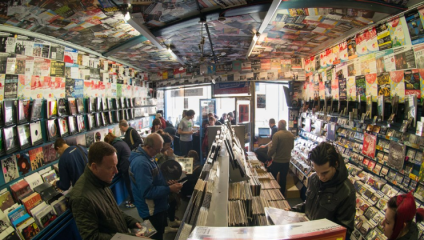
This one is so obvious you may not have even considered it. This is what we were doing for decades before Spotify made it too easy for us, and even suggesting it as an idea may feel corny on our behalf. “Of course, I can go out and buy music, obviously”, you might think, “but how is that an adequate replacement for the accessibility and practicality of Spotify?”.
Well, it isn’t. Buying records is expensive, you may not have a record shop nearby, and you’re limited to listening to only the music that you own. There’s a clear reason why online music services have taken over, as it is simply costly and inconvenient to do it the old-fashioned way.
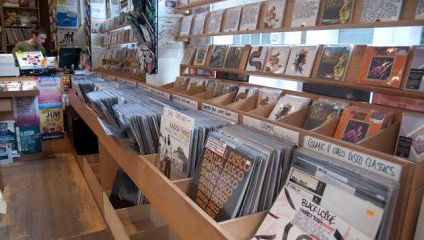
That said, absolutely nothing can beat it. Artists receive more of their fair share, even if they release on a massive label. You get to actually own the music that you love, becoming familiar with its album cover, the liner notes, often receiving a poster or a physical download card in tow, meaning you can upload the files to your phone for on-the-go listening. You get the best of both worlds; a physical library of music that cannot be taken away from you, as well as offering a digital option for you to sync with your phones music library.
You get to enjoy the experience of being in a record shop, chatting to customers pulling out albums you recognise, becoming a familiar face to the workers and owners of the shop, becoming part of a musical community that has been devastated by the internet. You can use this link to find a record shop near you. Most record shops will let you play before you buy as well, if you’re really down on your finances. It solves basically every problem set forward by Spotify covered at the beginning.
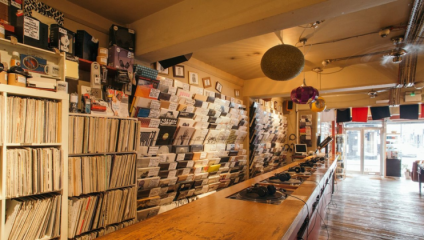
The biggest drawback of course is the relative price. For £10 a month I can listen to as much music as I want on the biggest music library on earth, so £20 for one record seems like an absolute rip-off in comparison. That fact cannot be ignored.
In response, you cannot have your cake and eat it. If you are against the depersonalisation and alienation of artists from fans, the artists lack of payment, and concerned by the longevity of non-physical media, you can’t also be unwilling to spend more money to support artists that you love. It’s as simple as that.
If the world of music is inaccessible to you via the cost of buying records, just do what you can. No one's asking you to be perfect, but if you are concerned by the fall of physical media and the artists suffering from it, you owe it to yourself to try your best. Maybe just buy albums from the artists you really love and stream the rest, or simply support artists at gigs by buying their merchandise (all the money is in merch these days). Maybe take a hybrid approach of part streaming and part owning. It's up to you to make the right choices as a consumer.